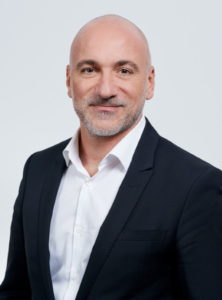Saudi Arabia is seeing an increased demand for more innovative medical devices and a greater awareness of the myriad ways that medical technology can be used for screening illnesses such as cardiovascular disease, cancer and diabetes. Stakeholders from three multinational medtech firms commented on their strategies for growth in this complex and burgeoning market.

In the Middle East, we sought out the market with the greatest potential. Naturally, that was determined to be Saudi Arabia.
The medical devices market in Saudi Arabia reached an impressive value of USD 3.87 billion in 2018 and is forecasted to grow over 9 percent in the period between 2018 and 2023. Growth has been driven by increasing investment in the healthcare system thanks to the government’s 2030 National Transformation Program. Further contributing to growth are an ageing population and a rising awareness about how medtech can be leveraged for the screening and treatment of diseases. Innovation in the sector has meant better and more sophisticated products which are increasingly in demand from both public and private healthcare players.
Multinational companies view this Gulf nation as a strategic choice to launch their portfolios. PharmaBoardroom spoke to key leaders of three medtech firms that are expanding into the Saudi Arabia region. Whether through partnering with health ministries, launching pilot programmes or building a solid talent base, these stakeholders emphasized the need for a solid strategy to navigate a complex market.
Zimmer Biomet, leader in orthopaedic medical technology, determined Saudi Arabia was a top choice for growth. In an interview with PharmaBoardroom, Ronald Boueri, Middle East general manager for Zimmer Biomet spoke on strategies for planning and executing its venture there: “In the Middle East, we sought out the market with the greatest potential. Naturally, that was determined to be Saudi Arabia. Many factors were considered when developing this venture, for example, how to manage such a large and diverse portfolio and accelerate growth in practically all segments…. It is always optimal to have full control of your market. However, to do this requires a direct sales force and direct organisation. Saudi Arabia, while promising, is at the same time a very complex market. I looked at the balance when recruiting those people. Getting talent is not easy, retention is also a challenge. Nonetheless, we have created a solid foundation in Saudi Arabia.”
Fujifilm’s healthcare division in the MENA region is helping to combat chronic diseases through innovative medical devices and screening programmes. Division manager Chihiro Sasaki commented to PharmaBoardroom that “our biggest market in the region is Saudi Arabia, which represents around 25 percent of the revenue, but the whole GCC area has been performing at a good level. In terms of products, [x-rays and mammography solutions] are driving the growth, almost 67 percent of the Medical division sales.” Sasaki further elaborated on the pilot launched in Saudi Arabia that was successful enough to replicate in other regional markets. “In Saudi Arabia, for example, we launched a pilot program to detect colon cancer in patients that lasted almost one year with the support of the Ministry of Health. The program demonstrated the big difference that screening programs can have, and the Saudi government has asked us to increase the magnitude of the program and we are looking to replicate it in other countries. We are already discussing potential programs with the authorities in the UAE and Kuwait.”
The Ministry of Health has also looked to Medtronic, a firm that has expanded into Saudi Arabia to offer its products to treat diabetes, a growing problem in the region. According to Majid Kaddoumi, Medtronic’s president of the wide swath of Central & Eastern Europe, Middle East & Africa, “We have signed a contract with Saudi Arabia’s Minister of Health for a pilot program that is already treating patients with diabetes, we hope to obtain great results. Expanding into this region and bringing more staff is a priority.” Kaddoumi further commented on the urgency of tackling the diabetes issue, “Diabetes is a disease that- if not treated correctly- can cause drastic burden because diabetes patients are more likely to develop other conditions like vascular diseases, cardiac diseases, kidney failure, etc. Healthcare systems around the world struggle to contain the damages associated with this condition, which means that everybody should treat it as a priority. But when it comes to the region, where unfortunately the prevalence is extremely high, the issue is even more urgent.”


